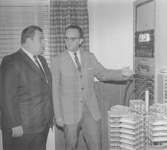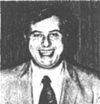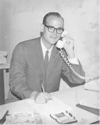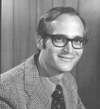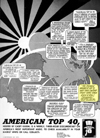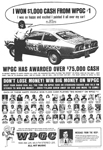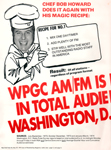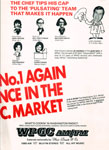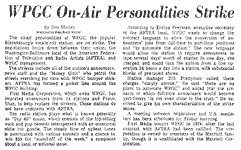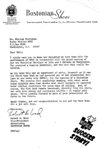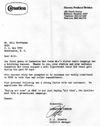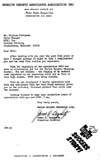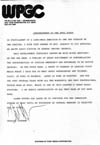In
July 1922, Leslie L. Altman
starts the Bradbury Heights Bus Line to Washington with 2 buses.
Its garage & offices were located at 1510 Southern Avenue
in SE, DC.
In 1926 it incorporates as the Washington, Marlboro and Annapolis
(WM&A) Motor Lines, Inc.
The
Federal Communications Commission grants a construction permit
for a new FM station to the Chesapeake Broadcasting Company, Inc.
in late 1947 to build and operate a station on 96.7 megacycles
at Bradbury Heights, Maryland, "just over the District of
Columbia line"
which selected and was granted WBUZ-FM as call letters for the
1KW station.
Treasurer
& General Manager
of WBUZ-FM was Leslie L. Altman,
President of the WM&A Bus Line.
In late 1948, Leslie L. Altman
was named President of the Chesapeake Broadcasting Co. while continuing
as WBUZ-FM's General
Manager.

Harry
Hayman
On
November 12th, 1953, Washington electronics engineer Harry
Hayman receives a construction permit to build and operate
a new Morningside, Maryland AM broadcasting station on 1580 kilocycles.
The call letters WPGC, representing Prince
Georges County
are issued late in 1953.
Glenn
Miller, grandson of Harry Hayman writes:
I am pleased to report that Harry Hayman is retired and living
in Boca Raton, Florida. He is 87 years old, has 4 children and
8 grandchildren (I am his second grandchild).
Harry
wrote:
I
rented the original land from Duval
B. Evans for the station and tower. He owned a convenient
piece of property and he was willing to rent it to me.
I
didn't have enough capital to run the station for the length of
time that it would have taken me to get profitable. Max
Richmond contacted me to take him as a partner. Which I did.
But he wasn't a very pleasant person and my wife and I didn't
get along with him very well. He made an offer to me for full
ownership and I sold out to him.
I
then returned to work at the Census Bureau on Univac One. From
there I went to work at the Navy. From there I went to work at
NASA on the Apollo project. When the Apollo Project was ending,
I took early retirement from Federal Civil Service. Then I took
a position as Executive Director of the IEEE Computer Society
for thirteen years.
And
here I am now retired in Florida.

Maxwell
Evans Richmond
Within
a month of its on air debut in October 1954, WPGC, Inc (Maxwell
Evans Richmond, President & sole owner) purchases WPGC-AM
from Harry Hayman for $10,000
on November 10th, 1954. He and his family would control the station(s)
for another 20 years.
Pat
McCoy, morning man in 1960 writes:
Max
Richmond was an even more difficult man to work for than Bob
Howard. Max would come down from Boston and harass everyone,
Bob the most, of course. He had an office hidden away in the back
of a bunch of file cabinets and partitions. He loved to pick up
his phone and listen to everyone's phone calls, sometimes butting
in, but most often just listening. I never heard him make a positive
comment to anyone.

Leslie
Smith
WBUZ-FM's
President Leslie L. Altman
names Leslie Smith as the
new General Manager
in 1955.

Gene
Winters
Gene
Winters is named General
Manager of WPGC-AM in 1955. On
March 30th, 1956, WBUZ-FM changes its call letters to WRNC-FM.
He is also named General
Manager of WRNC-FM in 1956. WRNC-FM
changes call letters to WPGC-FM in mid-March 1958.

Bob
Howard
Robert
Howard joins the stations early in 1959 as its new General
Manager. His larger than life character would surface on the
air in a variety of guises including 'Mr.
Sound Off, 'Captain
Good Guy', 'Mr.
X' & 'The
Riddler'.
Harv
Moore writes:
Bob
Howard had a "right of first refusal" on the sale of WPGC. When
the Richmonds tried to sell it
to the Marriotts, he exercised
it. Got a bundle ($425,000 total, in 1974 dollars!). He used
the money to buy WYSL and WPHD here in Buffalo in October 1974.
He asked me to moved up here and work for him. Bob sold the
stations in 1989 - walked away with 4.3mil...he passed away
in 1993.
Pat
McCoy, morning man in 1960 writes:
Bob
was a difficult guy, but a hard worker. I am glad to see he
profited mightily before he died. Before 'PGC I worked for Bob
in Baltimore (WAQE which later changed its call letters to WTOW).
After Bob left, the owner, Sam Booth, hired two successive genuine
lightweight managers. Neither of these guys could sell and all
of the other salesmen left shortly after Bob did. Business fell
off dramatically.
I
recall Bob as more relaxed there than at 'PGC. Good Lord, he
could not have been more tense. Max
Richmond was an even more difficult man to work for than
Bob. Max would come down from Boston and harass everyone, Bob
the most, of course.
Bob
once invited me to the first night of Passover seder, a new
experience for me. The two boys were small. Both had water pistols
and were squirting indiscriminately before their parents took
them away. We sat down to the table, all of us wearing yarmulkes,
Bob read from scripture, then we sampled the food, gefiltefish
and matzo ball soup, a few other less than appealing dishes.
I thought how could these two people, both fat, be so heavy
eating like this? How uninformed I was. After the tasting, Mrs.
Howard cleared the table and brought in platters of roast beef,
noodles, vegetables, etc.
Anita
Miller ('April May') writes:
Bob
was tough but fair and if you did good he was generous with
raises and praise. Cross him and he could berate you with equal
enthusiasm. He had a pair of lungs for sure. One of his rules
was no food or drink in the office as the equipment in the control
room was the scene of many spills and the engineers got tired of trying to get cheetos out of the turntables (yes
this was the prehistoric era of radio)
I
know for a fact Bob came in on weekends to be sure the weekend
guys were playing honest and he caught one poor hapless DJ with
coffee and a sandwich and gave him the axe. He finished his
show and I'm sure the listeners were very surprised to hear Mr. Soundoff doing the pratter
and taking requests. He did enforce the rule for everyone so
when Mr. Richmond and
Associates came to town they had to tke lunch in the hallway
or up on the 3rd Floor lobby because Bob refused to send out
for lunch saying if my employees can't eat in the office neither
can you. My Hero!
Beverly
Burch, Sue Gardiner & I used to act as hostesses when the station did Promo
Parties for visiting celebrities and we all helped with mail-outs
and contests. Boy did Bob love to give away money in those days!
The Missing "W"
contest, cars and $25,000 at a pop when other stations gave
away T-shirts and records. He had trade accounts with different
clients and the prize closet had everything you could imagine!
Bob encouraged all of us to come up with ideas to improve the
station or the ratings and we were Number 1 all across the board
regardless of age, time of day and the fact that we played Top
40 in a town that was pre-dominately Black or at least very
conservative. I swear, we had old folks in the home, bikers,
good-ol boys and gangsters listening to WPGC just to win money.
The Salesmen didn't
have any air-time to sell because we were sold out in all times
for six months in advance. One year we raised the rate card
3 times and still the spots sold. They were reduced to selling
spots when someone cancelled - didn't happen very often.
Ken
(Mezger) Carpenter remembers:
During
1963 & 1964, WPGC did live remotes from the Hampshire-Langley
Shopping Center in Langley Park. They did the 10AM - 2PM Bob Raleigh (Rolle Ferreria) show the 1st two weeks in June-July-August. The Chief Engineer, Wayne Hetrich, allowed
me and another boy named Bob Medve to set up the table, sign,
mixer, mic and cord each day. Each
day we showed up and set up everything and took it back down
at 2PM. At 13 years old, we felt very important!
One
day, General Manager, Bob Howard showed up unexpectedly
to do the show. While a record was playing, the person running
the control board at the station would get his instructions
and "cue word" from the announcer on the air. At one
point I heard Bob saying something like, "OK if you keep
missing my cues I'll come back there and clean house today".
His on-air name was, "The Mystery Voice." When
I saw this spectacle, I just started laughing
and couldn't stop for a long time, but I wouldn't let him see
me laughing.
BD
Howard writes:
I
remember well the glory days of WPGC during 1960's. Bob Howard
was my father.
My
dad was born Robert Howard Rosenthal. As
a youngster growing up during the depression, listening to the
radio was an important part of his life. He was born just over
a year before the 1929 stock market crash. He worked his way
through Ohio State University as a women's shoe salesman (a
job he hated), graduating at the age of nineteen.
My
parents met while both attended OSU. Upon his graduation, he
began his radio career at WVKO (1580 AM) in his hometown of
Columbus, Ohio, and legally changed his name by dropping the
last name. While under the tutelage of station manager Bert
Charles, he became a deejay, a sportscaster, a salesman, an
emcee at big band concerts, etc. He learned every facet of the
radio business while working seven days a week for a whopping
$50 per week.
Of
possible interest is his grandfather's story. My father's father's
father came to America from Romania in 1890, settling in Key
West, Florida. He finally brought his wife and four children
over in 1899, the same year that my grandfather was born (the
first family member born in the U.S.). They moved to Tampa in
1915 and ultimately had a total of ten children. Tragically,
this family patriarch was accidentally shot and killed just
a week after my dad was born.
My
brother Steve was born in '51 and I came along in '55. In '56,
my dad left WVKO to take his first management job at a station
in Burwick, Pennsylvania. He left about six months later, to
take the job of station manager at WAQE in Towson, a suburb
of Baltimore, Maryland. About two years later, he came to WPGC.
As
a kid of perhaps six or seven years old, I did a few spots for WPGC airplay. I particularly remember singing the jingle
for Foley Ford, 'Get
your Ford from Foley Ford, it's the thing to dooooo'.
My brother and I were the big kid and the little kid on the
block, giving safety tips to kids in PSA's. The union put an
end to that!
I
remember that when Lou Reed's 'Walk on the Wild Side'
came out, WPGC played it with its interesting themes but cut
out the word 'colored', just as when the 'Ballad of John and
Yoko' was played, the word 'Christ' was deleted. Although I
understood the controversies they wished to avoid, I thought
that they should either play these songs intact or just not
play them. (Whereas equalization is now used to suppress something
for airplay such as the four-letter words found in many songs
today, back then they edited a tape so that the word and that
beat were deleted, repeatedly breaking the rhythm of the song).
My
dad knew little of the current music they played on the air;
he preferred the big band sound that he grew up with (Jimmy
and Tommy Dorsey, Glen Miller, etc.) when not monitoring the
station. He never understood the psychedelic culture of the
late sixties and tried not to air any songs with drug references,
although the more subtle ones ('Lucy in the Sky with Diamonds',
'White Rabbit', etc.) were aired. He was quite entertained
by the names of some of the bands, his favorite was 'Big Brother
and the Holding Company'.
During
the '60's WPGC was always being played in my house. Whenever
my dad heard something he didn't like (such as dead air), he
would call the DJ and explode with an abusive tirade that I
found embarrassing. I remember hearing of that episode when Bob Raleigh (Bill Miller) crawled
through the roof after locking himself out of the studio.
After that, my dad always liked to call him 'Tiger
Dumb Raleigh'.
My
folks split and my dad remarried, and he and Solange had twin
daughters, Nancy and Yetta (named for my dad's mom, who passed
away in '66). It was Yetta's curiosity that found this site.
My
dad once tried to parlay the minor celebrity of being Mr.
Sound Off into a failed attempt at running for congress during
the mid '70's. Had he sought my advice…
As
he approached retirement, he amassed a collection of movies
from the era of his youth in VHS format. Then, he collected
baseball cards from this same era, an effort to replace a prized
possession from his youth that had been thrown away by his mom
several decades earlier. These complemented his enormous collection
of albums from this era.
On
the Studios & Offices:
I
remember that awful location at 4421
Southern Avenue. One opened the door next to the bus garage,
only to be greeted by a very long flight of stairs that led
to their facilities. The studios and offices themselves were
not bad, but the neighborhood had already begun a long downhill
slide that never seems to bottom out.
I
remember the move to the new facilities on the second floor
of the Parkway
Building. The building was set into a hill and the studios
were located along the rear of the building; pulling back the
curtain over the control room's window revealed a wall of dirt
- the rear exit to the parking lot was located on the third
floor. This building had an excellent, easily accessible location,
just off the Baltimore / Washington Parkway and just two exits
inside the D.C. Beltway. But like much of Prince Georges County,
eventually the area and even WPGC itself changed. Still, I am
amazed that no one wanted this commercial location and that
the building is gone.
I
remember when 'PGC added the FM simulcast, at first broadcasting
until midnight and then 'round the clock. FM broadcasting had
existed for ages, but very few owned FM radios so it was not
commercially viable until around 1966, when FM radios first
became widely available, especially in cars.
On
the Competition:
WEAM and WINX were the primary competition as rockers (WWDC was more adult oriented and so was more the competition for
advertising than for the youth listening audience). These stations
broadcast on AM only, and as FM caught on, with its superior
signal and sound quality (especially once FM stereo arrived),
WPGC kicked ass! WPGC was perhaps the first rocker on FM anywhere,
and they fueled the early growth of FM in the DC area.
But
they needed it; their AM signal was fairly weak and since the
AM shut
down at sundown (per the FCC license) they were at a distinct
disadvantage by not being heard at all during the evening or
the early predawn hours when many arise for work or school.
In fact, it is remarkable that as a daytimer they were as successful
as they were in competing with and often beating their full
time competition prior to the emergence of FM.
On
Max Richmond:
I
remember many of the people associated with WPGC from those
days. I remember that Max Richmond (the station's owner) had two girlfriends (hideous old broads,
in my humble opinion), and apparently neither of them knew about
the other. So as a kid, I was coached whenever I was to encounter
one - this one's name, and that I was NOT to mention the other
one.
On
Bill Prettyman:
Bill
Prettyman lived quite far from the station and was very
much the workaholic. He and my dad would compete to see who
could get to work first, both often arriving before 6 AM.
On
the Office Staff:
I
remember Dee Masano as a
serious, efficient woman who was probably a key person in the
business operation. I remember that I liked Bev
Burch primarily because she once gave us a puppy.
On
the Air Personalities:
I
remember the real names of Dean
Griffith (it was not Dean Anthony, his name on NY radio), Davy Jones, a couple of the Bob Raleighs,
etc.
As
a kid, I was struck by the fact that so many thought of these radio
personalities as major celebrities. Perhaps it was
because I saw them occasionally while to most they were much
less accessible, but compared to musicians, sports figures,
movie or television stars, or even politicians, I saw them as
being a bit lower in the pecking order.
But
obviously, these guys were a big part of the daily lives of
many listeners, some regular listeners even felt as though they
had a relationship with them. As local media personalities,
they were much more accessible than the national celebrities,
they could be seen at remotes and other appearances, and they
might even be reached by phone (especially if one knew the secret
phone number).
I
remember thinking how bizarre it was that so much of the on-air
talent made so little money compared to the salesmen,
since it was the talent that developed the listening audience
required before anyone would want to buy ad time. I guess to
some, the popularity and celebrity was almost compensation enough.
My
dad discouraged my even considering getting into radio, he often
called it a 'whore's business'!
On
Dean Griffith:
I
particularly remember Big
Ol' Fat Ol' Dino as a really good guy, and it is sad to
hear of his passing. I thought it strange that they took the
name Griffith from the stadium where the Senators played, which
itself was named for the original owner of the team, as if they
were related.
The
intelligence and candor of his comments probably should not
surprise me. He was absolutely correct about my father's problems
resulting from his excessive weight loss, the result of amphetamines
prescribed by some quack for this purpose, and his ensuing hospitalization.
His bizarre behavior in that Mr.
X episode was no doubt fueled by these terrible meds. From then
on, his emotional demons would haunt him and he was indeed prescribed
several medications, and no doubt working for him could be as
difficult as living with him.
On
Harv Moore:
My
dad hired Harv Moore out
of Kentucky and he seemed to stay with him forever (very few
others stayed for very long). My dad and I had a falling out
in '72 (my folks had split a couple of years earlier), and when
we reunited ten years later, he was in Buffalo and Harv was
still working for him doing his morning mayor shtick. I felt
as though I had stepped into a time warp; he seemed to be, after
Dick Clark, the world's second oldest teenager.
On
Cousin Warren Duffy:
I
remember Cousin Duffy's '68 Cadillac - his brand new gold convertible was painted with
a psychedelic scheme that most thought bizarre. It was no doubt
very cool to some, but most thought that he had ruined the car
and destroyed its resale value, although I often explained that
he could simply have the car repainted.
On
Davy Jones:
I
remember Davy Jones was a
really nice guy, he would invite me into the control room until
my dad forbade this (none of the other jocks permitted this
but for a moment or two). I remember riding in that quick '68
'Vette mentioned elsewhere on this site. (A small block, it
ran incredibly well, although he insisted that the only modification
done was he'd replaced the camshaft.)
As
a teenager, my taste during the '70's grew more towards what
was at first called 'album rock', then 'progressive' or 'underground'
radio. I hated disco! WPGC was more of a 'strictly commercial'
station (get the Zappa reference?) and my dad was not thrilled
that I preferred to listen to WMAL FM (which became Q107)
and WHFS (when it was located in Bethesda where I went to high school).
Many of the folks at WPGC, including my dad, smoked cigarettes
in those early days, so it should not be a surprise that for
some this tragically led to an early demise. My dad did eventually
quit (although he complained that he missed them for the rest
of his life). Unfortunately, he never did exorcise the demon
of overeating, that is, until he was overtaken by the terrible
illness that eventually stole his life at such a relatively
young age.
Today,
when I meet someone from the D.C. area, occasionally I'll mention
in passing that my dad ran WPGC during the '60's and some baby
boomers still seem impressed all these years later. But on the
rare occasion that I reveal that he was Mr.
Sound Off, many still immediately remember him to this day.
And I am often told that my voice sounds very much like his
did.
My
reply to this is always, 'Your response is welcome!'

Glenn
Potter
The
estate of station owner, Max
Richmond receives FCC approval on August 7th, 1974 to sell
the stations for $5.8 million to First
Media Corporation (Richard E. Marriott, Chairman
& 44% owner). The transaction is finalized on October
17, 1974. Outbid for the properties, Bob
Howard exercises his right of first refusal, leaves the station
and purchases WYSL in Buffalo. First
Media Corporation names Glenn
Potter as President and GM.

Bill
Prettyman
Long
time salesman Bill Prettyman
was promoted to Vice President and Station Manager in 1976. Glenn
T. Potter continued as President of First
Media Corporation.
Anita
Miller ('April May') writes:
Bill
was a trip! He got me involved in a remote broadcast one time
in one of the shopping malls just before Easter and I may never
forgive him. He planned to give away plastic eggs to the shoppers
with prize slips to get records, gift certificates to the different
stores or cash. His wife Sharon and I were supposed to man the
prize booth. The plan was for him to wear an Easter Bunny costume
as he gave out the prize eggs but he waited til the last minute
and no costumes were available. So he tells me the Friday before
the remote that the only costume he could acquire was a Playboy
Bunny costume and guess who had to wear it?!
I'm
sure you can figure out the ending to this story. Stop laughing
- it was not exactly my finest hour! Still, I heard later that
the stores claimed it was the best remote ever...business must
have been booming. To
my knowledge Sharon wouldn't let Bill take any photographs. But
I know people at the mall (shoppers and merchants) took some.
Visitors the site may still have some from their private collections
they could send in. I still have the hit man on retainer
to get Prettyman!

Charles
Giddens
Charles
Giddens is named the new General
Manager in 1980 when the venerable Bill
Prettyman leaves for station ownership on Maryland's Eastern
Shore.

Jeanne
Oates
Charles
Giddens leaves the station in
December 1982 for station ownership and is replaced by Jeanne
Oates. Ratings
tumult, as a mindblowing 50% of the station's cume leaves too.
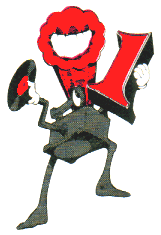
![]()
![]()
![]()
![]()
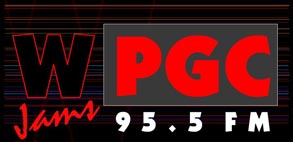

![]()
